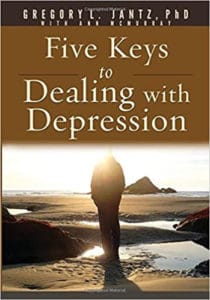
The War of Words
In this Adventures in Odyssey drama, a carelessly uttered word from Eugene creates havoc as it becomes the fashionable insult, resulting in a lesson about the power of words.
Home » Episodes » Focus on the Family Broadcast » Dealing With Anxiety and Depression During the Coronavirus
Excerpt:
Dr. Gregory Jantz: My concern is we probably have a lot of folks right now that social distancing has turned into social isolation. And we’re turning to food. People are turning to alcohol. People are turning to things that ultimately are self-destructive. And I need to say, years ago, that was me. And I think, if anything, I see that people feel like they’ve waited too long to ask for help. And, you know, there is help.
End of Excerpt
John Fuller: That’s Dr. Gregory Jantz and he joins us today on Focus on the Family. Your host is Focus president, Jim Daly. I’m John Fuller. And we’re gonna be talking today about how you can deal with anxiety and depression during this pandemic.
Jim Daly: John, anxiety disorders are the most common mental health issue in the U.S. Get this number. About 40 million adults in the U.S. report suffering from anxiety to some degree or another. And we have that in our family. There’s a family member that struggles with anxiety. So, I’m very close to this issue. And, you know, there’s coping mechanisms. There’s ways to deal with that. And I’m looking forward to talking to Dr. Jantz today.
John: Yeah, this is something that really kind of comes to the surface when there is a crisis like this pandemic going on.
Jim: Well, I saw a report that said calls to the National Mental Health Hotline have increased by almost 900%.
John: Mmm.
Jim: So that’s the evidence of what we’re talking about. If you’re in that place today and you’re struggling with anxiety or depression, or perhaps your spouse or your children are, we want to offer some help to you today.
John: And beyond the broadcast we have a lot of resources. We’ve got the book by our guest called Five Keys to Dealing with Depression. We can make a counseling referral session happen for you. A lot of great resources at focusonthefamily.com/broadcast. And Dr. Gregory Jantz has been here before. He’s a psychologist, a devout follower of Christ, and is nationally renowned for his work focusing on whole person health.
Jim: Dr. Jantz, welcome back to Focus.
Gregg: Good to be with you today. Such an important topic today.
Jim: Well, I appreciate it. You know, we’re practicing the distancing here. John’s in a different studio. I’m in and this one alone and you’re all the way on the West Coast, right?
Gregg: We’re doing pretty good about this distancing.
Jim: That’s so true. You say that many people may not even be aware that they’re experiencing anxiety or depression because of the coronavirus. So, I think the obvious first question, Dr. Jantz, is what are the signals? What should we be looking for in ourselves and perhaps are our close family members to discern whether or not they’re struggling?
Gregg: You know, this isn’t a time where we may be focused on all the fear around coronavirus. Let’s just look at some of the symptoms for example. If you’re struggling with anxiety or depression – and by the way, anxiety now is being called the “new depression.”
Jim: Huh.
Gregg: And so, if you’re living with somebody and maybe we all have gone through some shock. We’ve all gone through this. We’ve been traumatized by all this.
Jim: Sure.
Gregg: And it’s kind of like we don’t know what’s next. And there’s this theme of fear right now in our lives or a theme of unknown. You know, some of the things that you may notice. A person may simply be overwhelmed. You can’t concentrate. Uh, we see a lot with sleep disruption. It’s like, oh, you wake up in the middle of the night and you can’t go back to sleep, or you wake up and your heart’s racing. And so, sleep is an area that we always want to look at that could really be affected by anxiety. I think, too, I’m seeing a lot of folks with just some anxiety around the future and the financial stress, which is very, very real. And so, this translates over – there’s chronic stress. And this chronic stress to our bodies. You know, we may have headaches. We may have digestive issues. We may have great difficulty just kind of functioning throughout the day because we can’t seem to concentrate. So, you know its anxiety if it’s got physical symptoms.
John: Hmm.
Jim: Yeah. Before we get there, I want to explore a little bit of that connection you make between anxiety, panic and what’s happened, you know, just a couple weeks ago with the grocery stores. My sister…
Gregg: Yes.
Jim: …Is a manager at a major grocery store and she had lots of stories to share with me about just the bizarre behavior some people expressed in this time. I mean, wiping out milk. One woman bought 15 gallons of milk and another woman wanted $3,000 worth of beef. Other people, before they put some kind of limits on toilet paper, I mean, that that row at the grocery store has been missing in action for weeks now. Toilet paper unavailable. And really, what’s bazaar, is why are people driven to that kind of what I would say is an expression of anxiety? They’re overbuying and – and doing these things for protection or self-preservation, I guess. I’m just curious how all those toilet paper buyers are doing right now with a garage full of toilet paper.
(Laughter)
Gregg: Well, you bring out an excellent point, because fear and panic – we run in herds. And so, what happened – and, um, it’s somewhere here in Seattle, somebody started this toilet paper purchase and it had a ripple effect. And if you’ll notice, um, people join these herds. And part of it is, “OK, well if everybody’s buying toilet paper or everybody’s buying something. I have to do something, too. I have to do so.” And so, there’s that sense, if I do something, I’ll have more control. And you’re right. There’s a line where we cross, and it becomes hoarding. There’s a line we cross, and it becomes greed. And I need to tell you, I did a personal experiment. We drove by one of the – the Costco warehouses and I did not go inside. This is a few weeks ago. But I observed the behavior from the outside. And it was. It was – you could feel the fear in the air.
Jim: Huh.
Gregg: And then we drove – my wife and I, we drove one mile away. And one mile away was a grocery store. And we went inside. Besides wiping the handle, uh, with the disinfectant wipe, everything seemed normal. I even went over to where the toilet paper…
Jim: Right.
Gregg: …Just to do a little test. And it was all there. And there were not people behaving in a panic. And so, I share that story in that it some of it is, “What are we going to join in on?” And I think, you know, we’re promised that God did not give us the spirit of fear. We have power and love. And of course, the final part of that verse is a sound mind. How do we operate with all this pressure? And I know there’s – the financial pressures for many can be really, really great. I want to acknowledge that. But we can still do this with God’s spirit and not joining a herd of panic.
Jim: Dr. Jantz, let me move to another theme. You know, you’re not just the practitioner, the psychologist. You have experience paralyzing emotional numbness, trauma for yourself. Describe what that felt like. What happened? And your recovery process.
Gregg: Yes, I had a season and it was a while back, but I had a season of depression and I would say mine kind of moved over to despair where I felt – I was no longer doing good self-care. Things that I loved to do I stopped doing.
Jim: Hmm.
Gregg: And I really began to isolate. And my concern is we probably have a lot of folks right now that “social distancing” has turned into “social isolation.” And we’re turning to food. People are turning to alcohol. People are turning to things that ultimately are self-destructive. And I need to say, years ago, that was me. And, um, I really was in a significant depression and anxiety. And I was asking this question, “Am I in the wrong career? Did I miss my calling?” And it really took my family’s intervention into my life where I needed somebody to throw me the life preserver. And I was not seeing things accurately. And, you know, I didn’t look well. And somewhere I have some pictures from the past and they go, “Wow.” It’s like, you know, it may be 20 years later, but I sure look better now. You know, that’s what depression – it’ll oppress us. We stop self-care. But I also remember – and it for me, you know, to rebuild physically. And it probably took a good, you know, six months to a year to fully get in that strength zone. And I know what I don’t ever want to go back to. And with God’s help. But I know what it’s like to walk out of it. And I think what happened for me was there was a real empathy and a real passion that got ignited. I got clear on my mission, my calling and what I was to do. And part of that is, um, to really – there’s answers for our anxieties. There’s answers for the depression. And I think, if anything, I see that people feel like they’ve waited too long to ask for help. And, you know, there is help.
Jim: Yeah. In that regard, um, you discuss the need for emotional comfort. I mean, some people are going to see that and say, you know, “The Lord is my comfort.” I get that. But describe that human need that we all have to some degree for that emotional comfort. What does it look like? How do we get there if we’re feeling anxious being at home? I mean, I’m out of my routine. I used to love to come into work and get the job done. Then late in the afternoon, five o’clock, I’d go work out at the gym before heading home for dinner.
Gregg: Yes.
Jim: I haven’t been able to stick with that routine now. I mean, I’ve got some things at the house to – to work on, but it’s not like being at the gym. And that’s kind of been, you know, uh. I’m feeling like I had a good year and a half run being consistent and now I’m struggling to be consistent.
Gregg: Absolutely. And I can relate to that as well. And one of the things that happens is, you know, we’re going to work. We’re doing things that are bringing us meaning and we’re excited about. And then that’s like all that got taken away. Um, we’ve got to re-establish, okay, what’s going to be healthy? Here’s what I did. You know, I – I’m claiming this, the Lord is the strong tower. And so, in my home, where’s my place of safety at home that’s my quiet spot that represents going to that strong tower? Is it a favorite chair, favorite quarter? But it’s a place where I’m going to reset myself. Maybe it’s a time of devotion. And I’m going to begin each day with three gratitudes. And that may be very simple. Three, gratitudes. And I’m going to maybe keep a journal and I’m going to write those down. And then from there, that’s my re-anchoring point. It’s my resetting point.
Jim: Yeah.
Gregg: Some of the other things that we need to look at is our self-care. And I noticed that when people are anxious and depressed, they tend not to drink enough water. Now, I know that sounds so simple, but, um, water consumption when you’re anxious and depressed is really important. What happens is…
Jim: I have a question about that. Hang on one second.
Gregg: Yeah.
Jim: I’ve got a question but let me come back. John’s going to let people know how to get ahold of us.
John: Well, I do want to make sure that folks listening and watching know about Dr. Jantz’s great book Five Keys to Dealing with Depression. As well, we have caring Christian counselors here on staff and we are open. We’d love to schedule a time for you to talk to them. Get some starting points in having a conversation with a family member who’s struggling or your own struggles. Finding that path toward healing. We’re a phone call away. Our number is 800, the letter A and the word FAMILY. Or stop by focusonthefamily.com/broadcast for more.
Jim: Dr. Jantz, in fact, you had a story about, I believe, a patient of yours who was drinking a lot of coffee. This one was a little convicting for me.
John: (Laughter).
Jim: But, you know, talking about that hydration issue, because I thought, “You know, coffee gives you a little hydration, right? It’s made with water.” But what happened?
Gregg: There you go. Yes. So, one of the things that we look at is what’s going in your mouth and this is good for us all to look at this. Here’s a gentleman who struggled with depression for so many years and anxiety. And, you know, the question really hadn’t ever been asked, “Well, you know, what do you put in your mouth?” So, we do something called food diaries. Just log what you’re eating and drinking. And, uh, we looked in and he had written down “pots” and it said “10 to 12 pots of coffee a day.”
John: Oh, my.
Jim: (Laughter) Oh, my goodness.
Gregg: And I really thought he meant cups. (Laughter) I thought he meant cups.
Jim: Did you hear that, John?
(Laughter)
Gregg: Yeah.
John: I don’t have that much, Jim. I’m really not that bad.
Jim: You’re down to two pots there. That’s good.
John: (Laughter).
Gregg: You know, and here’s – here’s his response. He said, “Well, it’s just that the home coffee machines, you know.” “Well, what do they hold?” “12 to 14 cups.”
Jim: (Laughter).
John: Wow.
Gregg: And overtime – now, it was subtle, and this is what happens. The self-destructive behaviors. They’re subtle and they’re sneaky and they kind of grow slowly over time. So over time, he had really worked himself up all day long. That’s all he did was drink coffee. And he did – he actually did work from home. And there was a part of his life that was real successful. But his health, his depression, his anxiety, obviously was very high. Well, you know, you just cannot – God didn’t design us to have that much coffee. (Laughter) Okay?
Jim: Right.
Gregg: And so sometimes we don’t realize some of the self-destructive behaviors we’re doing because we’ve normalized it and say, “Well, that’s just what I do.” And so, this is a time to reset. “Am I doing any self-destructive behaviors? Am I, uh – am I my turning to food?” We know that, you know, the whole area of alcohol really concerns me because we’re seeing that the purchase of alcohol is way up. People are isolating. So, they’re beginning to do self-destructive behaviors that later are going to have some real regret.
Jim: Mm. Well, that’s and that’s part of the problem. Let me come back to something you mentioned as well, the irritability factor. You know, we’ve experienced a little bit of that in the Daly household. It’s been mild. But, you know, I think if I could be blunt, I think I can say and be a little silly and it kind of gets on Jean’s nerves a little bit. (Laughter)
Gregg: Yes.
Jim: Uh, but, you know, how do we manage that irritability factor in our households when we are sheltered-in-place? We have our kids with us. There’s a lot of different activity going on. Whether that’s schooling them or worrying about them in the older kids’ case. We have a junior in high school.
Gregg: Yes.
Jim: So, you know, Jean’s got an eye on that and how much time he’s spent in between other things and that. And that’s usually our pillow talk is her concern that he’s not given it 125%. (Laughter)
Gregg: Right.
Jim: And I’m trying to say, “It’s OK. It’s all right.” “You need to care more.” You know? (Laughter) So just bring it down to real world experience. Speak to irritability, because that’s a real problem. If someone’s very irritable, what could that be a sign of?
Gregg: Yeah. The irritability I’m always going look – well how’s sleep? What are we doing under the self-care? Is there enough physical activity? Uh, that’s a very important piece. The other is – we did this around our family table here recently. I actually started with a personal confession and we had our family around the table, and I said, “You know, I’ve had a lot going on and lot’s been consuming my mind. And I realize I feel like I haven’t really been fully present for you guys. And I love you so much. And I’m so sorry. I just – I’ve been consumed, and I know I’ve been short at times.” And – and so, I just talked about it. And so, we just made it an open discussion. And I said, “If this happens, please have grace for me. I love you greatly. And it’s OK. You can point out something to me. It’s all right.” (Laughter) So…
Jim: That’s great.
Gregg: We – we just had a discussion for all of us, which led to, you know, what are other family members feeling? And then it led to the next area was – well, how can we support one another?
Jim: Mm. No, it’s really good. I think one of the ways the boys and I are dealing with, you know, being cooped up – last night we were out with airsoft guns playing capture the flag. (Laughter)
Gregg: Love it.
Jim: So, it was a lot of fun.
Gregg: Yes.
Jim: Hey, on a really serious note, you learned something profound about attitude from a Holocaust survivor. Explain what that was and the setup. And what did you learn?
Gregg: Yes. You know, we learned that for those who really – and I believe that we need God’s help to do this. But you think about Victor Frankl. You know, he survived Nazi Germany concentration camp. And he ended up studying, “Well, what was the difference for some who really survived?” And, you know, the bottom line, and I know we’ve been told this before, is that we can’t always control our circumstance. Well, wow. Is that true right now?
Jim: Absolutely.
Gregg: Um, but we have a choice. And we can choose optimism for the future. We can choose hope. And he talked about you can also choose joy. And so, if you can imagine that in a concentration camp and cruel concentration camps. Choosing optimism, choosing of a future of hope. Here’s what’s important. We’re not on the Titanic. It’s not the Titanic syndrome happening here.
Jim: Hmm.
Gregg: We’re not going to sink. We’re going to help one another. And we’re going to do this as a Christian body. We’re going to come together. We’re going to help one another and we’re going to grow through this.
Jim: Dr. Jantz, when I hear that story, the question I have is perhaps one of the most difficult questions people will ask, and that is, “I don’t have that optimism. I don’t possess that personality to just be optimistic.” And I think that’s the question even in World War II, in those concentration camps. There was this difference between those that had that optimism, that had hope and that survived or lived longer than others. But how do the others that aren’t in that optimistic community or they’re finding it hard, what is that mechanism to do it, though? You have to have – it has to come from somewhere within. And that’s the difference. And if I’m not a glass-is-half-full kind of person, how do I become that?
Gregg: Yes. And I think we ask God to help us become that. And also, have at least two, maybe three, individuals in your life that are praying for you, that are there for you, that really know how you’re doing. There’s power in that prayer. And I’m saying just a couple folks, because you’re going to be able to do that for somebody else later on. I – I’m going to also say we need to limit the digital distractions. (Laughter)
Jim: Hmm.
Gregg: OK? We’re too absorbed. You know, it’s so easy to go from, you know, cable channel to cable channel and – and news notifications. And if you’re working from home right now or – and you’re looking at screens all day, you know, by the end of the day, you can be pretty anxious.
Jim: Right. Dr. Jantz, many people may feel like they need to put on that brave face. I’m thinking moms and dads, particularly if they have children in the home. What are some healthy outlets to release that tension while we’re trying to maintain that parental brave face? You know? Even though underneath the surface of that brave face, we might have our own concerns. I mean, people are losing their jobs. We have millions of people who have lost their job right now. They may be concerned about how they’re going to make their rent payment or their mortgage payment or buy groceries. How do we manage that super stress?
Gregg: And it is. And that’s – can be very intense and it can be very overwhelming. Well, one of the dangers that we may fall into is we may have kids at home. And fear is something we feel. When you walk into a room and a person’s full of anxiousness and panic, we feel it. We – we can see it and feel it. And I want us to remember that our kids are like sponges. And so, they’re going to feel a lot of that. They may not know exactly what it is, but they’re going to be the ones absorbing a lot of that fear and anxiety. So, that’s where we’ve got to have – if it’s a spouse or if it’s a close friend, we’ve got to have somebody that we’re processing that with because otherwise – and it’s not our kids. It’s easy to be saying things out loud or, “I don’t know how I’m gonna pay the rent or we’re gonna get groceries.” And we’re saying those things in front of our kids…
Jim: Mmm.
Gregg: …As a part of our stress. And so, I – that has a ripple effect. So, we need to always be careful what we’re verbalizing out loud. And I get it. This is an intense time. And I – I know that for some. “Oh, I don’t know if I’m going to be able to pay rent. I don’t know if there’s gonna be enough groceries.” So that’s something we need to problem solve with somebody probably beyond our kids.
Jim: Absolutely. Without a doubt. At the other end of that, the other book end of that is something you refer to as “positive God talk.” That sounds a little funny, to be honest, but I’m sure it’s helpful. What does it mean – “positive God talk”?
(Laughter)
Gregg: Well, for me, that’s going back to the Scriptures. And that’s why if you – if you could just see my desk right now, my three-by-five cards.
Jim: (Laughter)
Gregg: I really do try to practice what I preach.
Jim: That’s good.
Gregg: And so, you know, I’m rotating my – my old fashioned three by five cards. (Laughter) And, you know, the positive God talk is simply speaking the truth of the Scripture.
Jim: Hmm.
Gregg: And you may not feel it. You may not – it may seem very foreign and you may even feel some anger. Anger at God that you’re in this place. Or you feel very alone. And we’re not meant to go through this alone. And that’s why, uh, God is going to send for you that person that’s gonna be in your life to help you walk through this. Remember, when we’re anxious and we’re fearful, it’s hard to see options. We can’t concentrate. Our creativity goes way down. So, it’s hard to see options. So, really, don’t do this alone.
Jim: Yeah.
Gregg: And go back and keep getting your – even if you don’t feel it – but keep getting re-anchored in God’s truth. You know, again, I’m holding mine for the day. “Be strong and courageous. Don’t be afraid.” “Okay. God, I’m gonna I’m gonna literally walk that out today and I’m gonna practice that truth. I don’t know how, but I’m gonna believe it by faith and see what God’ll do today.”
Jim: It’s so true. Before we close, we’re wrapping up. Maybe it’s the ending where we started. Being mindful of people with anxiety, with depression, maybe unknowingly. What are some signs again, that it’s time to get some help? And what are ways to do that right now during this coronavirus shelter-in-place environment?
Gregg: Absolutely. Well, depression can lead to despair. Here’s how you know if you’re in despair. You’re on the very edge. You’re not thinking rationally. And there are some folks go, “I don’t see any way out of this.” And you start to have those irrational thoughts like, ‘It’d be better off if I wasn’t even around or alive.’” So, the basic functioning of doing my daily self-care. Uh, there’s those that, you know, I have not showered for a week or I’m not eating. I’m not doing basic hygiene. Not doing the self-care which is so important. That’s just a sign. And I would suggest, even if you’re working from home, still take care of yourself as, you know – still be presentable. If you have found that, uh, you know, “I’m not I’m not functioning. I don’t have an appetite. I don’t even think I slept last night.” You know, there’s that that sleep that you’re in this zone where you go, “I don’t know if I’m sleeping” because they’re full of fear. Those are some signs. Look, pick up the phone and ask for some help. Don’t stay on the edge of despair.
Jim: No. Those are really good suggestions, Dr. Jantz. Let me just say, it’s been really encouraging to talk with you the last 30 minutes, and I so appreciate it. Thanks for being with us.
Gregg: So good to be with you and we can do this together.
Jim: Very good. See you now.
Gregg: You bet.
Jim: Let me turn to the listener and the viewer on YouTube. You know, things are continually shifting in this environment. We’re listening and hearing from the President – different governors about what is in front of us. When states will be opened. You know, it’s all over the map. People are talking about being shut down for many more months and others are saying we need to open up right away. We can’t control when that will be. So, we’ve got to be informed. But I’m concerned that it is driving anxiety and we are here for you at Focus on the Family. I mean, thanks to the donors who support the ministry, we have caring, Christian counselors who can do a consult with you. Who can talk you through those anxious feelings. Maybe even the depression that you’re feeling. We may be able to refer you to somebody in your area that can help continue that discussion or we can give you some great resources to strengthen you in your journey right now. And one of the things I want to do with Greg’s book – this is great. Five Keys to Dealing with Depression. It’s a small book. I’ll make this available to anybody who needs it. And I’m going to trust by faith that others will take care of us financially for doing so. So, if you’re in that spot where you’re feeling anxious or depressed, get ahold of us here at Focus on the Family. Get a free copy of this book Five Keys to Dealing with Depression. And it’s our way of saying we’re here to help. And for those of you that can help us, God bless you.
John: And we do appreciate those who can support us. We understand if you’re in a spot where you can’t. Either way, as Jim said, get in touch and let us send this book Five Keys to Dealing with Depression to you. And if we can, we’ll be happy to schedule a time for you to talk to one of our caring, Christian counselors as well. Additionally, we have a really rich website full of Covid-19 coping skills and tools for you as you and your family continue to deal with these uncertain times. All of this available at focusonthefamily.com/broadcast. Or call 800, the letter A, and the word FAMILY. Well, thanks for joining us today and listen in next time as Dr. Kathy Koch shares ideas for enjoying your family time together.
Teaser:
Dr. Kathy Koch: I hope that we take into our new season after the quarantine is lifted, something that we gain from this. Including prioritizing fun and games and wrestling with our kids. You know, when we play with our kids and explore with our kids and read with our kids, they benefit. And so, do we.

Gregory Jantz , Ph.D., is a state-certified chemical dependency counselor, a licensed mental health counselor, and a nationally certified eating disorder specialist. He is an internationally recognized expert on a wide range of afflictions including anxiety, depression, abuse, and addiction, and a go-to media source expert on these topics who’s been interviewed by major outlets like CNN, FOX, ABC, CBS, and many more. Dr. Jantz is the founder of The Center • A Place of HOPE which is regarded as one of the nation’s top 10 best facilities for the treatment of depression. He is the best-selling author of nearly 40 books including Five Keys to Raising Boys, Don’t Call It Love, and his latest, Healing Depression for Life. He and his wife, LaFon, have two sons. Learn more about Dr. Jantz by visiting his website, drgregoryjantz.com.

Receive the book Five Keys to Dealing With Depression for your donation of any amount!

Visit our online store and purchase a CD of today's program for yourself or to share with a friend.

Focus on the Family offers a one-time complimentary consultation from a Christian perspective.

Dr. Don Graber of Focus on the Family's Physicians Resource Council answers some commonly raised questions about anxiousness and anxiety disorder.

I don't know if you've heard, but there's a virus going around. In fact, experts call it a pandemic. But I'm not talking about the COVID-19 (coronavirus) crisis – I'm referring to the virus of worry.

Feeling depressed? Bible verses about faith and hope along with coping skills may offer help to families during the hard times of quarantine.

Here's how you can help your loved one out of the darkness of depression.

Kids don't face the same pressures as adults, but the reality is that children can suffer from depression and its effects every bit as much as grown-ups. Keep in mind, however, that children may manifest different symptoms than adults.

In this Adventures in Odyssey drama, a carelessly uttered word from Eugene creates havoc as it becomes the fashionable insult, resulting in a lesson about the power of words.

This discussion offers a preview of Volume #16 “Cultures in Conflict” from the That The World May Know video series, available below.

Debra Fileta will help couples better understand the four seasons of healthy relationships, what to expect during each one, and how to carefully navigate them for a stronger marriage. (Part 1 of 2)

Larnelle Harris shares stories about how God redeemed the dysfunctional past of his parents, the many African-American teachers who sacrificed their time and energy to give young men like himself a better future, and how his faithfulness to godly principles gave him greater opportunities and career success than anything else.

Amy Carroll shares how her perfectionism led to her being discontent in her marriage for over a decade, how she learned to find value in who Christ is, not in what she does, and practical ways everyone can accept the messiness of marriage and of life.

Jonathan McKee offers parents practical advice and encouragement in a discussion based on his book If I Had a Parenting Do Over: 7 Vital Changes I’d Make.